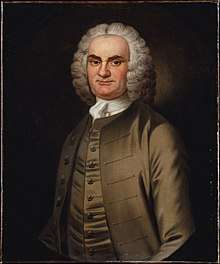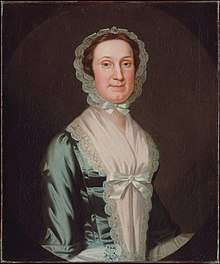Joseph Reade (politician)
Joseph Reade (1694 – March 2, 1771)[1] was a merchant, vestryman, and politician from New York.[2]

Early life
Reade was a second-generation English prominent merchant. He was the son of English merchant Lawrence Reade, who arrived in New York from Saint Michael, Barbados,[3] around 1691.[4] His brother was John Reade.[5] His sister, Mary Reade, was first married to William Vesey, the first rector of Trinity Church in Manhattan.[6] After his death, she married Daniel Horsmanden, a chief justice of the supreme court in the Province of New York and member of the governor's executive council.[7]
Career
Reade was prominent in New York business, political and social life. He was first a member of the vestry of Trinity Church in 1715, and later a warden of the Church, a role in which he served for over fifty years.[2]
In 1725, the same year he endorsed "a petition to ban the sale and export of spoiled flour", he was elected assessor of the East Ward of New York. Reade was appointed a member of the governor's council by then Governor of the Province of New York, Robert Monckton, in 1761,[2] serving until his death in 1771.[8] While on the council, he advised the next governor, Sir Henry Moore, and his Lt. Governor, Cadwallader Colden, to "delay the issuance of the stamped paper required by the unpopular Stamp Act."[2]
Reade participated in the grand jury, with Frederick Philipse II as Justice of the Supreme Court of Judicature, of New York Slave Conspiracy trials of 1741 which,[2] based upon questionable testimony, resulted in death sentences for thirty-four defendants and the deportation of ninety-one others away from the colony.
Personal life

In 1720, Reade married Anna French (1701–1778). Anna was the daughter of Phillip French, who served as the Mayor of New York City from 1702 to 1703, and Annetje (née Philipse) French, the daughter of Frederick Philipse, 1st Lord of Philipsburg Manor, a Dutch merchant and one of the richest men in colonial New York.[9] Anna was the sister of Philip French III, who married Susanna Brokholst,[10] daughter of Anthony Brockholst, acting Governor of Colonial New York under Sir Edmund Andros.[11] Together, they were the parents of seven children,[2] including:
- Laurence Reade (c. 1721–1773), who was a merchant in partnership with Richard Yates.[12] In his will, Laurence acknowledged and provided for the three children he had with "a mulatto woman on the Island of Jamaica."[13]
- Joseph Reade.[1]
- John Reade.[1]
- Anne Reade (1726–1772), who married Gerrit Van Horne (1726–1765), a grandson of Robert Livingston the Elder.[1]
- Sarah Reade (1728–1802), who married James de Peyster (1726–1799), a grandson of New York mayor Abraham de Peyster.[14][10]
- Mary Reade, who married Francis Stephens.[1]
Reade died on March 2, 1771,[1] at which point he had considerable holdings in mines, minerals, and ores, which were left to his three surviving sons in his will.[1]
Descendants
Through his daughter Anne, he was the grandfather of Gerrit Van Horne Jr. (1758–1825), who married Ann Margaret Clarkson (1761–1824), the sister of General Matthew Clarkson, both children of David Clarkson and Elizabeth (née French) Clarkson, a cousin through the French family.[15]
Through his daughter Sarah, he was the grandfather of James Abraham de Peyster (1753–1798), a Loyalist during the Revolutionary War who married Catherine Livingston (1759–1839) and moved to Saint John, New Brunswick, where he eventually became treasurer of the province; Sarah de Peyster (1761–1802);[16] and Mary Reade de Peyster (1765–1790), who married Dr. Jacob Ogden Jr. (1762–1802) in 1789 (the parents of James de Peyster Ogden, the President of the New York Chamber of Commerce and Saint Nicholas Society of the City of New York).[17]
Joseph was also the grandfather of Joseph Reade (d. 1809) and John Reade (1745–1808), who established a prominent freighting business and married Catherine Livingston (1756–1829) in 1774.[18] They were the parents of Catherine Livingston Reade (1777–1863), wife of Nicholas William Stuyvesant (1769–1833); Helen Sarah Reade (1790–1879),[19] wife of Erie Canal Commissioner James Hooker (1792–1858);[20][21] and Anne Reade, the wife of Robert Kearney (grandparents of Anna Morton, the Second Lady of the United States).[22]
Legacy
Reade Street in New York City's Lower Manhattan is named after him.[23][24]
References
- Collections of The New-York Historical Society For The Year 1898 | Publication Fund Series. New York: The New-York Historical Society. 1899. p. 415. Retrieved 12 September 2018.
- Caldwell, John; Roque, Oswaldo Rodriguez; Johnson, Dale T. (1994). American Paintings in The Metropolitan Museum of Art. Vol. 1: A Catalogue of Works by Artists Born by 1815. Metropolitan Museum of Art. p. 26. Retrieved 12 September 2018.
- Convention, Episcopal Church General; Archives, Episcopal Church General Convention Commission on; Hobart, J. H. (1912). Archives of the General convention. Privately printed. p. 105. Retrieved 12 September 2018.
- Goodfriend, Joyce D. (1994). Before the Melting Pot: Society and Culture in Colonial New York City, 1664-1730. Princeton University Press. ISBN 0691037876.
- Goodfriend, Joyce D. (1994). Before the Melting Pot: Society and Culture in Colonial New York City, 1664-1730. Princeton University Press. p. 60. ISBN 0691037876. Retrieved 12 September 2018.
- New-York Historical Society | Publication Fund Series. New York Historical Society. 1896. p. 85. Retrieved 12 September 2018.
- Morgan, Dix (1898). The Parish of Trinity Church in the city of New York. new York: Putnam. Retrieved 2011-10-15.
- Greene, Richard Henry; Stiles, Henry Reed; Mott, Hopper Striker; Totten, John Reynolds; Forest, Louis Effingham De (1894). The New York Genealogical and Biographical Record. New York Genealogical and Biographical Society. p. 126. Retrieved 12 September 2018.
- Archdeacon, Thomas J. (2013-09-20). New York City, 1664-1710: Conquest and Change. Cornell University Press. ISBN 9780801468919.
- Reynolds, Cuyler (1914). Genealogical and Family History of Southern New York and the Hudson River Valley: A Record of the Achievements of Her People in the Making of a Commonwealth and the Building of a Nation. Lewis Historical Publishing Company. p. 1326. Retrieved 12 September 2018.
- "Susannah French Livingston". womenhistoryblog.com. History of American Women. 30 January 2009. Archived from the original on 13 July 2016. Retrieved 16 November 2017.
- Colonial Records of the New York Chamber of Commerce. New York Chamber of Commerce. 1867. p. 395. Retrieved 12 September 2018.
- Collections of The New-York Historical Society For The Year 1899 | Publication Fund Series. New York: The New-York Historical Society. 1900. pp. 244–245. Retrieved 12 September 2018.
- McKito, Valerie H. (2015). From Loyalists to Loyal Citizens: The DePeyster Family of New York. SUNY Press. p. 114. ISBN 9781438458120. Retrieved 9 June 2018.
- The Clarksons of New York: A Sketch. New York: Bradstreet Press. 1876. p. 49. Retrieved 13 November 2017.
- "DE PEYSTER, ABRAHAM – Volume IV (1771-1800)". www.biographi.ca. Dictionary of Canadian Biography. Retrieved 12 September 2018.
- Alstyne, Lawrence Van; Ogden, Charles Burr (1907). The Ogden family in America, Elizabethtown branch, and their English ancestry: John Ogden, the Pilgrim, and his descendants, 1640-1906. Printed for private circulation by J.B. Lippincott company. p. 109. Retrieved 9 June 2018.
- Livingston, Edwin Brockholst (1910). The Livingstons of Livingston Manor: Being the History of that Branch of the Scottish House of Callendar which Settled in the English Province of New York During the Reign of Charles the Second; and Also Including an Account of Robert Livingston of Albany, "The Nephew," a Settler in the Same Province and His Principal Descendants. Knickerbocker Press. Retrieved 10 August 2017.
- "DEATH OF MRS. HELEN S. HOOKER". The New York Times. February 1, 1879. Retrieved 20 February 2018.
- "A FAMOUS LADY.; DEATH OF MRS. SARAH HELEN HOOKER-- A REPRESENTATIVE OF COLONIAL DAYS-- HOW AN INFANT HAS FALLEN HEIR TO A VAST ESTATE". The New York Times. February 2, 1879. Retrieved 20 February 2018.
- Dexter, Franklin Bowditch (1912). Biographical Sketches of the Graduates of Yale College: With Annals of the College History. Holt. p. 339. Retrieved 20 February 2018.
- "John Reade Family Papers". www.lib.udel.edu. University of Delaware Special Collections Department. Retrieved 12 September 2018.
- The Clarksons of New York: A Sketch. Bradstreet Press. 1875. p. 186.
- "The History of Reade Street | Linda Reiner and Lisa Deslauriers Present: 150 Reade Street". medium.com. 20 February 2018. Retrieved 12 September 2018.